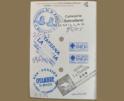
Faith
The wounds caused by the breaking of the marital bond are profound and painful. They cannot be healed by the cheap medicine that the language of "rules" and "punishments" purports to offer.
One of the most beautiful aspects of priesthood is also among the most painful. The Catholic people -- and even many who are not Catholic -- admit their priest into the most painful aspects of their lives. Whether in the confessional, spiritual direction, at the hospital bed, standing with them at the grave of a loved one, or sitting with them in the rectory parlor, priests are with people in their pain and suffering. Sometimes through the ministry of the sacraments, we are able to offer to those in pain the immediate relief for which they long. At other times, there is no quick path to healing. Despite our desire to take away quickly the suffering of the person in front of us, we recognize that we stand at the foot of the Cross. This is a moment for reverence and not a time to offer a quick fix.
Among some of the most painful and complicated situations are those involving divorce and remarriage. Many couples whom I have encountered in this situation have received poor instruction along the way. They have been misled into thinking that they are not able to receive communion because the Church is punishing them. This sort of bad instruction only makes them feel more alienated from the Church. Sometimes they might be looking for a priest who will just provide a quick fix and tell them not to worry about it. But, more often than not, I find the people whom I meet are looking for a priest who will stand with them in their suffering and who will help them remain at the foot of the Cross.
The indissolubility of marriage is not a ludicrous "rule" of the Church nor is it an administrative determination that can be changed under new management. Pope Francis has sought to make the process of receiving an annulment less burdensome, but he has also emphasized Christ's own teaching that a valid marriage is permanent and indissoluble. When, therefore, the Church counsels a divorced and remarried person against receiving the Eucharist, it is not because the Church is imposing a punishment. The Church is pointing out that living in a union that violates the indissolubility of marriage is inconsistent with the reception of the Eucharist. While this is painful for the person in front of us, let me assure you that it is also painful for the priest who loves this person. This is made more painful because these situations are often filled with complicating factors. In the face of this, it can be tempting to apply any remedy quickly than to apply the right remedy properly.
The wounds caused by the breaking of the marital bond are profound and painful. They cannot be healed by the cheap medicine that the language of "rules" and "punishments" purports to offer. Mercy is not a flimsy bandaid that one places over deep wounds as though it will make them all better. The Good Samaritan did not apply just a bandage to the man left by the side of the road. He cleaned, anointed, bandaged, carried, lodged, paid a price, and promised to return. This is true mercy. It is not a quick mercy that makes the physician feel better but does little for the one who is wounded.
Persons who find themselves in these painful situations should be assured that their being unable to receive the Eucharist is not a punishment. It is an honest acknowledgment that a wound is still present and in need of true healing. Their increasing hunger for the Eucharist is a beautiful sign of the healing unction of Christ's mercy at work in their soul. The shepherds of the Church are most helpful to these brothers and sisters of ours when, by our fidelity to them, we stand with them at the place from where all true healing comes: the Cross.
FATHER DAVID BARNES IS DIRECTOR OF THE CATHOLIC CENTER AT BOSTON UNIVERSITY. HE BLOGS AT SHEPHERDSPOST.BLOGSPOT.COM.
Recent articles in the Faith & Family section
-
All eyes on RomeJaymie Stuart Wolfe
-
On the Camino: Many CaminosMark T. Valley
-
Pedestal deserved: Carlo Acutis' digital authenticitySister Hosea Rupprecht, FSP
-
ConclaveArchbishop Richard G. Henning
-
Journey to the Ends of the Earth in PrayerMaureen Crowley Heil























